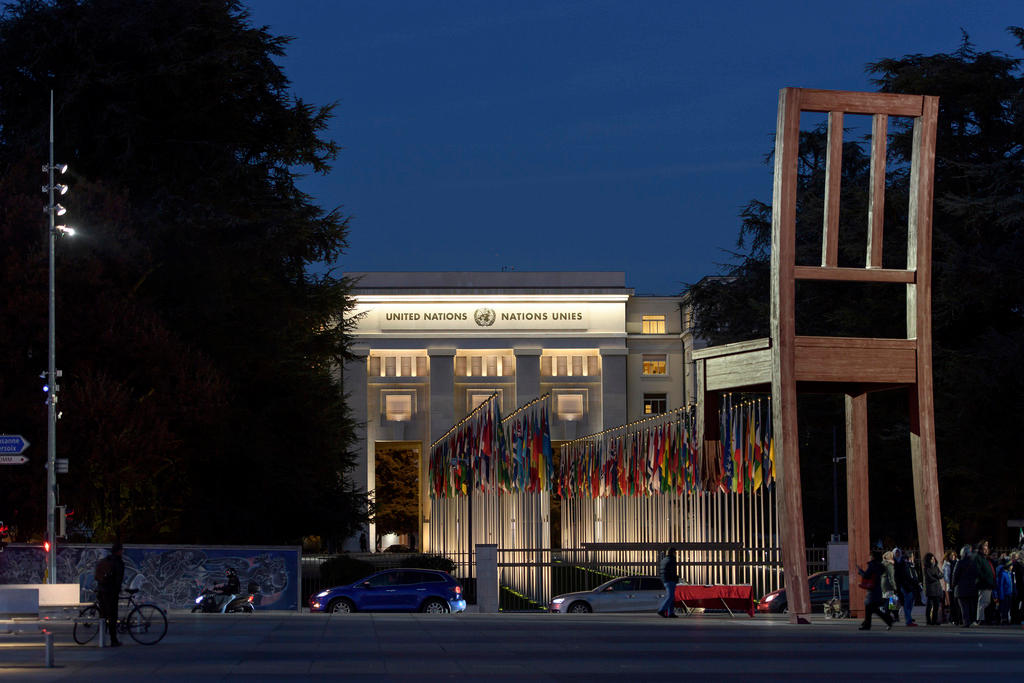The challenges of branding a Swiss city

Is Geneva best known as a hub for international organisations and peace talks, or the role it plays in global corruption and tax scandals?
“For much of the world, International Geneva means a lot of corruption,” Jamil Chade, correspondent for Brazilian newspaper O Estado do Sao Paulo commented recently at a Swiss Press Club discussion amongst journalists on how best to report on the international community in Geneva.
Money-laundering and corruption scandals, often involving illicit bank accounts or property linked to politically exposed people (PEPs) – such as deposed Haitian dictator Jean-Claude “Baby Doc” Duvalier or former Democratic Republic of Congo president Mobutu Sese Seko – have in the past put Geneva in the headlines.
More recently were the cases of stolen bank client data from HSBC’s Geneva branch and whistleblowing information about an undeclared account held by former French budget minister Jérôme Cahuzac.
Chade said about 80% of his reporting from Geneva was linked to corruption stories, where he investigated the financial activities of Latin American “crooks”.
Most recently he has covered the Odebrecht bribery scandal spanning several Latin American countries with funds allegedly deposited in Swiss banks.
Delphine Dezempte, a senior analyst at Alaco, a business intelligence firm that investigates the profiles of public and private individuals, told swissinfo.ch that she had similar impressions.
Lack of transparency
“Even though Geneva has been trying to promote international initiatives, the city remains a place of opaque jurisdiction. Geneva is not always the best in terms of promoting transparency in corporate records, litigation or tax regimes,” she said.
The consultancy Dezempte works for is tasked by Swiss financial institutions and commodities traders to investigate potential clients, in order to comply with Know Your Client (KYC) requirements.
She noted a lack of transparency in the lengthy processes taken prior to freezing of PEP assets – including those of dictators Moammar Gaddafi of Libya and Zine El Abidine Ben Ali of Tunisia – from local banks.
“That clashes with the image Geneva would like to maintain of being an international city welcoming people from different industries around the world.”
That image – packaged by Geneva and Swiss authorities – is to project the city as a centre where governments come to resolve disputes.
Peace talks good for economy
Dozens of international organisations, and hundreds of permanent missions and non-governmental groups are based in the city, and it has been the setting for many peace talks over the years.
The authorities have strong economic incentives to keep them in the city.
According to a 2012 study by the University of Geneva, international organizations, NGOs, missions and consulates spend some CHF3.3 billionExternal link in the canton. And one out of ten jobs is in the sector.
That’s why some find it so important to promote Geneva as an international city.
According to Olivier Coutau, the Geneva government representative to International Geneva, “The name gives a sense of community to all the Geneva-based international actors striving to build a better world. If these actors feel that they belong to the same community, cooperation among them can only be facilitated. The more they cooperate, the more they share resources, the more efficient they are and the stronger international Geneva is.”
Locals feel left out
But the authorities are not only fighting to convince the outside world of the city’s pre-eminent place globally, but also locals who have felt the negative side effects. Among them are concerns over rising crime and the fairness of tax exemptions for employees of international organisations.

More
Trump jitters cast shadow over close US-Geneva ties
Recently, Presence Switzerland, the federal government body responsible for Switzerland’s image abroad, collaborated with the UN in Geneva on a programme to promote the work of the international community locally.
The Perception Change ProjectExternal link included student works, initiatives with local hospitals, as well as an interactive storybook about how Geneva agencies are involved in the United Nations Sustainable Development Goals (SDGs)External link.
Aziyadé Poltier-Mutal, who heads the programme, said it offered an opportunity to change the narrative away from the “narrow” accounts in the media of what the UN does.
Nicolas Bideau, ambassador and head of Presence Switzerland, admits however that promoting International Geneva is a difficult task.
City’s global impact
According to his office’s monitoring of the international press, the media focuses on the talks or decisions made in Geneva – whether on Iran’s nuclear programme or the Syrian peace negotiations – and not on the place where they were held.
“It is not International Geneva as such that is perceived abroad,” Bideau says. “There is work to be done to reinforce the perception of International Geneva. We don’t want to see organisations leave Geneva.”
To that end, Presence Switzerland will promote the city at this year’s world expo in Astana. Its plan is to highlight Geneva’s role in supporting the UN’s Sustainable Development Goals at the fair in the Kazakhstan capital.
“We have an image problem. Most people do not realise how important Geneva is for the stability of the world.”
Presence Switzerland is also working with banks since the dealings of some of these in what is the country’s most important financial centre after Zurich have led to the poor press abroad.
Changing rules of the game
For Bideau, the rules of the game have changed in recent years with the end of Swiss banking secrecy and Switzerland’s implementation of the international standard for the exchange of information for tax purposes.
Dezempte is not convinced these moves alone will do much to improve Geneva’s image abroad.
“There is still a lot of shady things going on in the background,” she commented.
Back at the press club, some journalists argued the city’s international branding would have more impact if reporters were given greater access to important conferences and talks taking place in the city.
But for others, like Philippe Mottaz, former head of news at Swiss public broadcaster, RTS, there will always be two sides to the coin. “We have to accept International Geneva with all its contradictions – where tobacco giant JTI and the World Health Organization are both headquartered.”
When ‘Geneva’ is mentioned, what do you first think of? Let us know in the comments section below.

In compliance with the JTI standards
More: SWI swissinfo.ch certified by the Journalism Trust Initiative












You can find an overview of ongoing debates with our journalists here . Please join us!
If you want to start a conversation about a topic raised in this article or want to report factual errors, email us at english@swissinfo.ch.